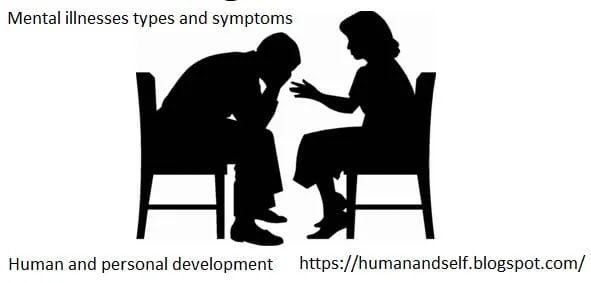Here is a list of common mental illnesses today and their symptoms, but before that and in the beginning, you must know that mental health means that the individual's personality is free from disorders and deviations, in addition to his ability to family and social harmony and achieve success in his work and production and his ability to face adversity, crises and frustration without That his balance is disturbed and collapses, while mental illness is the complete opposite of all of the above.
Common mental diseases have two types of diseases (neurotic-psychotic), and given the importance of neurotic diseases and their spread over a greater extent than psychosis, I will talk about them, as the individual may suffer from this type without knowing.:
List of common mental illnesses today and their symptoms
hysteria
The personality is multiple and the patient does not remember the personality that he previously lived and whether he lived it or not.
Genres: (Transformational hysteria - hysterical coma - sleep wandering - subconscious wandering - multiple personalities)
Symptoms: (memory disturbance - highly suggestive - rapid mood swings).
Phobia
It is a fear of (a subject, thing, or situation) that does not elicit fear.
Ex: fear of darkness or heights.
Symptoms: Fear, distress, and anxiety do not appear on him unless the subject of his fear appears.
Obsessive
Ideas that haunt the patient and accompany him and he cannot expel or get rid of them despite his awareness of their unreality and strangeness.
Symptoms: fatigue - tiredness.
Compulsion
The patient performs repetitive, monotonous motor actions in a single pattern that does not achieve any benefit.
Example: A person washes his hand's dozens of times on the pretext of preventing germs.
Here, the patient himself strives not to complete the action to convince him of irrationality, but he fails and surrenders to the internal impulse.
This means that the motive behind the possessive action is stronger than the emotional will.
An important note: (The obsessive-compulsive disorder is characterized as kinesthetic / while obsessive-compulsive disorder is characterized as intellectual) In both cases, the patient knows that he is ill.
Hypochondria
The individual imagines that he has actually contracted a disease, and this means that he has a predisposition to quickly contracting a disease, as he is always fearful and cautious so as not to contract the disease.
Neurothenia
The patient feels constant fatigue, fatigue, and weakness in vitality and activity.
Species:
- Sensitivity disorders such as (continuous headache - hypersensitivity)
Sensory disturbances such as (ringing in the ears)
- Visceral functional disorders.
- Breathing disorders such as (shortness of breath and pseudohypertrophy)
- Digestive disorders such as (intestinal relaxation and stomach cramps)


Comments
Post a Comment